Practice Tools
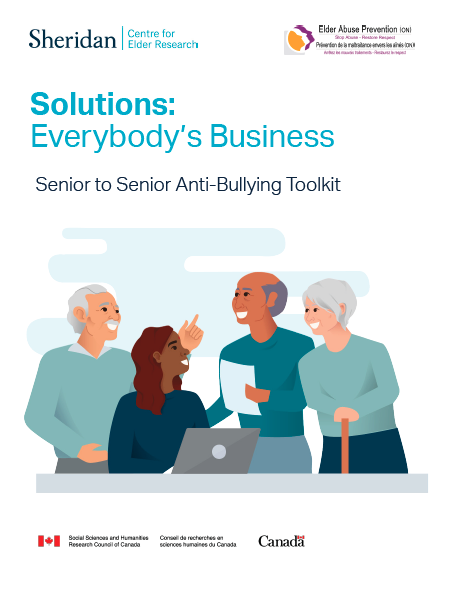 "This Toolkit is intended to assist residences and organizations working with older adults to establish strategies for tackling bullying specifically between older people. Though existing best practices targeting bullying behaviours amongst other populations help to inform this Toolkit, the focus is on older adults, and as such, special consideration is given to this age group by utilizing the results from the SSHRC funded Seniors’ Bullying in Ontario Project.
"This Toolkit is intended to assist residences and organizations working with older adults to establish strategies for tackling bullying specifically between older people. Though existing best practices targeting bullying behaviours amongst other populations help to inform this Toolkit, the focus is on older adults, and as such, special consideration is given to this age group by utilizing the results from the SSHRC funded Seniors’ Bullying in Ontario Project.
Though this Toolkit is intended for senior leadership and staff from seniors’ residences and organizations, the more people engaged with this Toolkit the better. Involving clients early on encourages ownership of an anti-bullying initiative. That said, an individual or group will need to co-ordinate this initiative. Further, the Toolkit itself, contains modules with instructions for a facilitator to use in order to run the specific activities. "
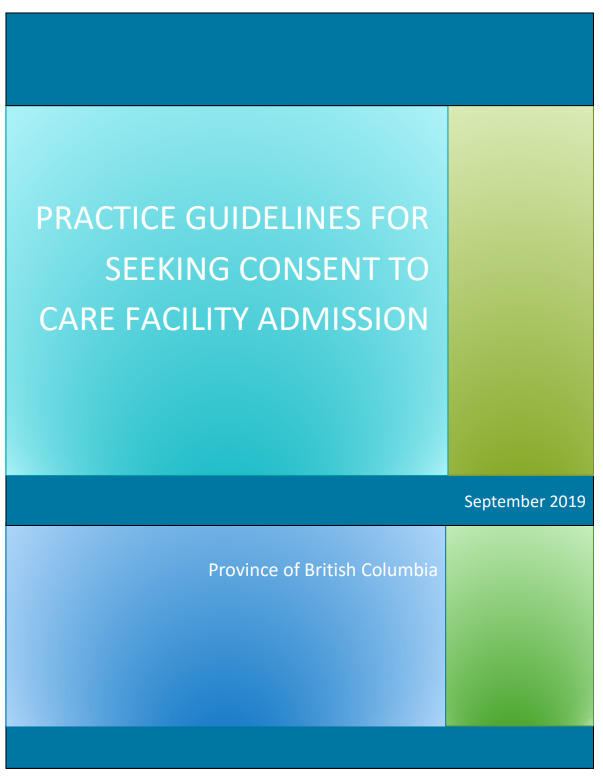 ''There are a number of laws in British Columbia that aim to assist and protect the rights of adults who may be incapable of making their own decisions and may be in need of support. The Health Care (Consent) and Care Facility (Admission) Act (HCCCFAA) is the law that governs both consent to health care and consent to facility admission.
''There are a number of laws in British Columbia that aim to assist and protect the rights of adults who may be incapable of making their own decisions and may be in need of support. The Health Care (Consent) and Care Facility (Admission) Act (HCCCFAA) is the law that governs both consent to health care and consent to facility admission.
In BC, capable adults have the right to consent, withhold consent, or revoke consent to healthcare. According to Part 2 of the HCCCFAA, health care providers must seek and obtain consent before providing treatment. Similarly, Part 3 of the HCCCFAA requires consent before an adult is admitted into a care facility. While many features of consent to facility admission resemble those for consent to health care, seeking consent to health care and seeking consent to facility admission are separate and distinct processes with their own specific legal requirements. This document is focused on consent to care facility admission.
Practice Guidelines for Seeking Consent to Care Facility Admission (the Guidelines) is based on the legal requirements of Part 3 of the HCCCFAA, and on best practices in BC and other jurisdictions. The Guidelines describe processes for seeking consent to admission to a care facility and for conducting an incapability assessment if an adult seems unable to give or refuse consent to admission to a care facility.
Source: Government of British Columbia
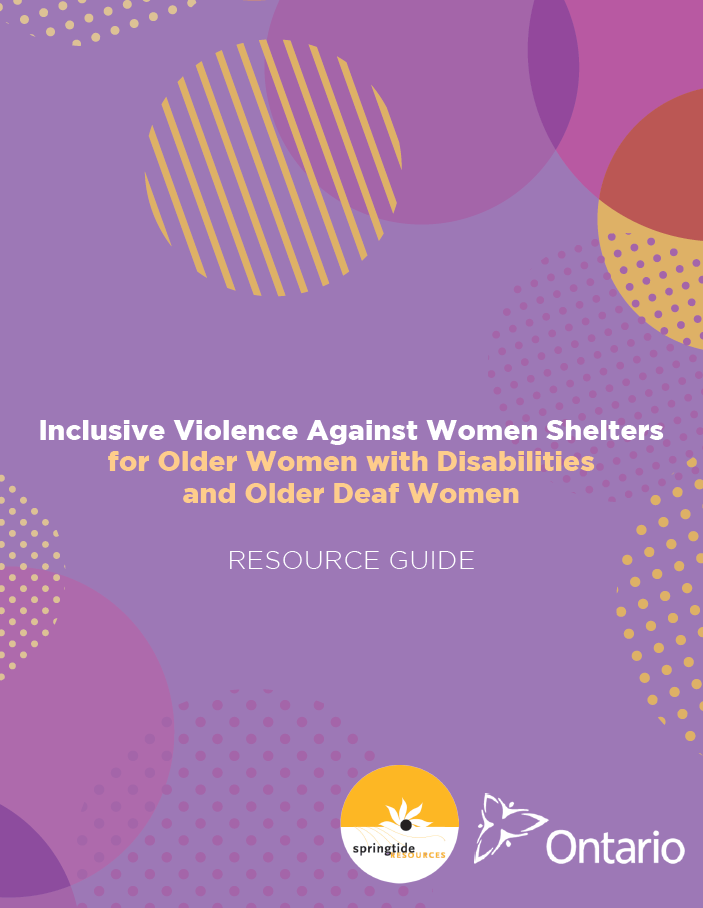 What is this guide?
What is this guide?
This resource offers information to shelter workers to learn about the nature of violence and barriers older women with disabilities and older Deaf women experience in accessing shelter services, in order that shelters can proactively address these issues within the context of their service provision. We are defining‘older’ adults and/or seniors as age 65 years plus, since many government benefits begin at this age designation. A key component of this guide is for VAW shelters to learn about the Accessibility for Ontarians with Disabilities Act (AODA) in order to understand the minimum requirements that they are obligated to comply with under the law.
Why was this guide developed?
Research studies continue to confirm that women with disabilities are abused at a much higher rate than women without disabilities. Studies indicate that women with disabilities are sexually assaulted at a rate at least twice that of the general population of women. The rate for women with intellectual disabilities and Deaf women is even higher than other women with disabilities.Violence against older women is also pronounced with almost 63% of older women (per 100,000people) reporting having experienced family violence.For over a decade now, questions around access to women’s shelters for women with disabilities and more recently, older women, have been flagged given such pronounced rates of violence. Lack of access to shelter services is going to become more of an issue as older women with disabilites and older Deaf women, like the general population, are experiencing an increased in life expectancy beyond what was typically mid-life.
Source: Ontario Association of Interval and Transition Houses
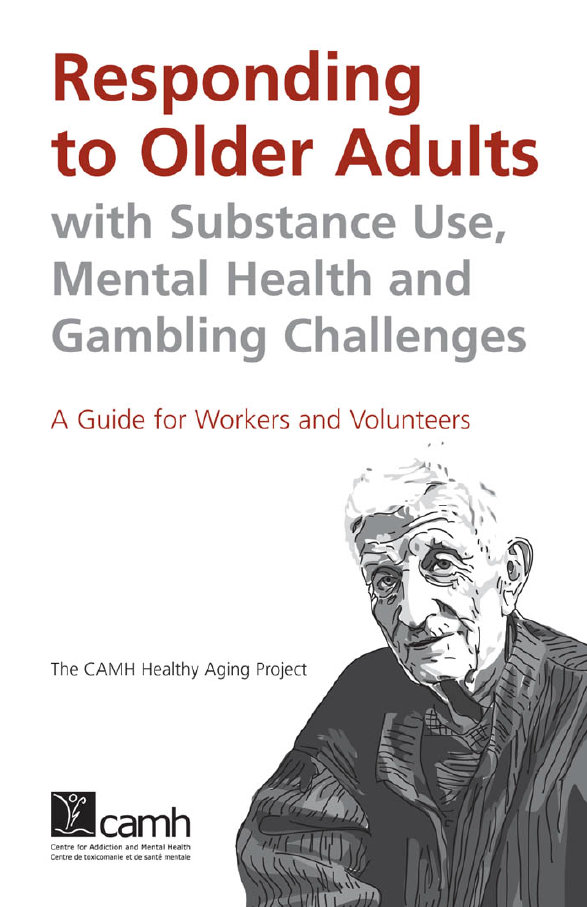 This booklet is for people who work with older adults in their homes, in the community and in long-term care. This includes personal support workers, health care aides, meals-on-wheels and friendly visitor volunteers, and staff at seniors’ centres, residences, apartments and nursing homes. This booklet is also for people who supervise or educate first contact staff. Some readers may have more or less training and experience than others, but all work in close contact with older people.
This booklet is for people who work with older adults in their homes, in the community and in long-term care. This includes personal support workers, health care aides, meals-on-wheels and friendly visitor volunteers, and staff at seniors’ centres, residences, apartments and nursing homes. This booklet is also for people who supervise or educate first contact staff. Some readers may have more or less training and experience than others, but all work in close contact with older people.
Why have we written this booklet for you?
The work you do as a worker or volunteer is important. The services you provide and the attention you give to older adults are essential to their care, their dignity and their quality of life. The work you do also helps to support the families of older adults, who may not be able to provide care themselves. This booklet was written in recognition of some of the challenges you face in your important work, and to offer information that may help you to better understand and feel more comfortable with certain older adults. It can be hard to know what to say or do when you see older adults who behave in ways that make you think they may have a substance use, mental health or gambling problem. You may not be sure what to look for, how to talk to the person about it or what you can do. Since you work in close personal contact with older adults, you may be the first to notice a problem. If the problem is mild, you may be able to help the older adult yourself. When it is more severe, you may need to tell others who can help. As the first contact, you can make a difference. Your approach can influence how older adults feel about themselves, about their difficulties and about you and others. How you respond to older adults can help to build trust. This can make it easier for them to accept help from you or from others, such as doctors or social workers. There is much to know about substance use, mental health and gambling issues that affect older adults. This booklet won’t make you an expert, but it will give you a lot of important practical information that can help you in your work.
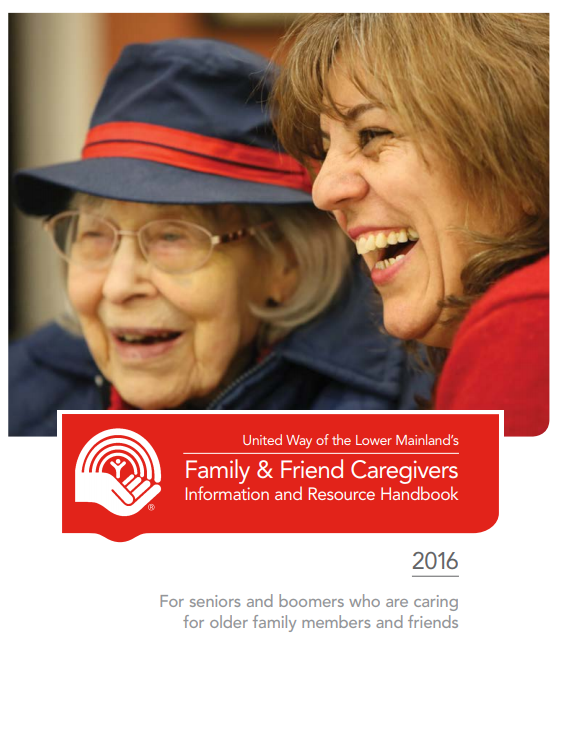
1. Talk with the people you care for about planning ahead and their wishes for their ''old age'' - Please don't wait until a crisis occurs
2. Caregiving =- Don't try this alone! (Family Caregiver Alliance motto)
3. Practice self-care
Source: United Way of the Lower Mainland
Page 2 of 15

















